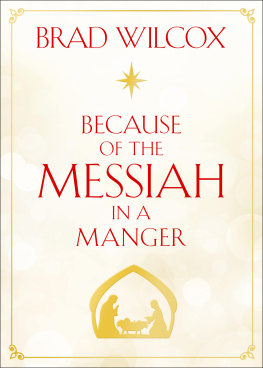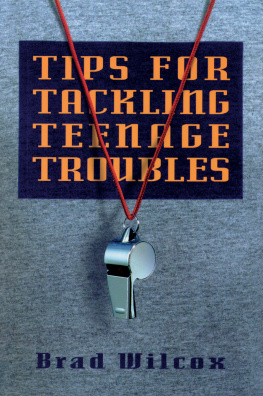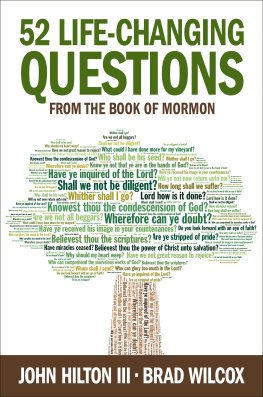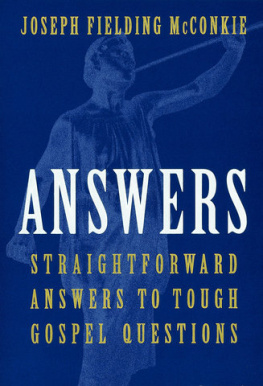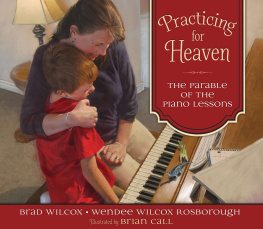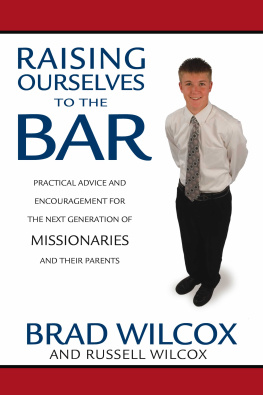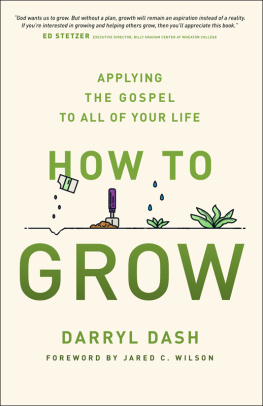Growing Up
Gospel Answers about Maturation and Sex
Brad Wilcox
2000 Brad Wilcox.
All rights reserved. No part of this book may be reproduced in any form or by any means without permission in writing from the publisher, Deseret Book Company, P.O. Box 30178, Salt Lake City Utah 30178. This work is not an official publication of The Church of Jesus Christ of Latter-day Saints. The views expressed herein are the responsibility of the author and do not necessarily represent the position of the Church or of Deseret Book. Deseret Book is a registered trademark of Deseret Book Company.
Foreword
A lot of books are available on human maturation and sex, butfew of them address this sensitive topic in the context of Latter-day Saintbeliefs, values, doctrines, and standards.
Many books describe sex as nothing more than a biological urgeto be satisfied. Masturbation is considered okayeven healthy.Homosexuality is presented as an acceptable lifestyle. Teenagers are toldthat sex before marriage is all right as long as the partners really care abouteach other. Some books that attempt to offer values-based advice to youngreaders suggest only that those who engage in sexual activities be safe andresponsible. Such advice is wrong and is not compatible with our HeavenlyFathers plan for our happiness.
This book focuses on the facts of life from an LDSperspective. Its author, Brad Wilcox, is uniquely qualified to do just that.Brad is an associate professor of education at Brigham Young University. Beforethat he taught sixth grade for three years (one of my sons was in his class).Thats when he began teaching a boys maturation clinic for his schooldistrictsomething he continues to do in schools throughout Utah. Thishas given him front-line experience responding to questions that come from boysand their parents.
Brad also works with thousands of young people who attend ChurchEducational System youth programs, such as Especially for Youth. In addition,he serves as bishop of a student ward at Brigham Young University. Brad lovesyoung people and is familiar with their needs, problems, pressures, andtemptations.
As one who works with young people myself, I know how importantit is that the issues in this book be addressed. As a medical doctor, I havereviewed the manuscript and found it to be accurate and informative.
Of course, parents have the primary responsibility for the sexeducation of their children. This book can be an aid to parents in thatimportant endeavor. Sister Chieko N. Okazaki wrote, For every child, there issomething important about having someone outside the family explain a valueheld in the family. All parents need partners (LightenUp! [Salt Lake City: Deseret Book, 1993], 87). Perhaps through thisbook, Brad can be a partner with LDS parents in presenting the right information at the right time to help young peoplemake the right choices asthey grow up.
Thomas E.Myers, M.D.
Acknowledgments
It is said that writers dont choose theirtopics, their topics choose them. That hascertainly been the case with this book. The idea for this book has beenmaturing in my mind since I was asked to present my first maturation clinicin 1986. I wish to thank Lincoln Card, the principal at Edgemont ElementarySchool in Provo, Utah, where I taught sixth grade, for guiding me through myfirst years of teaching and for inviting me to teach the annual boysmaturation clinic.
I am grateful for my wife, Debi. As a registered nurse and amother, she provided valuable insights and assistance in revising themanuscript. As my wife and best friend, she provided constant love and supportupon which I have come to depend so heavily. I appreciate my parents, Ray T.and Val C. Wilcox, who reviewed the rough drafts of this book and respondedwith the same frankness I learned to expect from them when my brothers and Iwere growing up. Im glad they were always willing to discuss sexual issues inan open, honest, and reverent way. I also appreciate my parents-in-law, Leroy and Mary Lois Gunnell, for their feedback and suggestions on the manuscript.And I thank Dr. Thomas E. Myers, who reviewed the book for accuracy and waswilling to write the foreword. Thanks, Tom. Youre the best.
My four childrenWendee, Russell, Whitney, andDaviddeserve prizes for the patience they have had with their dad. Thistime around Wendee and Russell deserve two extra gold stars. These teenagersprovided valuable reactions and viewpoints. Im thankful for their help, thoughI know it probably seemed weird to read a sex book written by their dad.
I must also acknowledge supportive friends: Hal and BarbaraJones, Kenneth and Kathy Cope, Clark and Julie Smith, and Ellen Allred. Theyhelped me brainstorm and encouraged me to finish the projectespeciallywhen they saw what was and what wasnt available from other publishers on thesame topic. I also wish to thank Emily Watts, Michael Morris, and the rest ofthe team at Deseret Book for being so wonderful to work with.
Finally, thanks to Brad Allen, a young priests quorum adviserwho went many extra miles for me. I admire him and his family and will never forgethis willingness to answer my questions and talk with me while I was growing up.
Introduction
A Word with Parents
It can feel awkward talking to children about maturation andsex, but its important. If children do not initiate discussions, we must lookfor appropriate opportunities to bring up the subjects ourselves.
Some parents worry that by speaking frankly with their childrenabout their bodies and sex, they are somehow promoting or condoning promiscuousbehavior. My experience has taught me that the opposite is true. The mostsexually active teens are usually the least informed. It is silence andignorance, not open communication, that often leads topoor choices. The more solid sexual information young people gain from theirparents, the more capable they are of making righteous and mature choices.
Regarding parental duty to teach children about sexuality, theFirst Presidency has said: This responsibility cannot wisely be left tosociety, nor the schools: nor can the responsibility be shifted to the Church. It is the responsibility of parents to see that theyfully perform their duty in this respect (ConferenceReport, April 1969, 13).
Some awkwardness can be avoided if we talk to children about sexand maturation in private. Even family home evening may be too public a settingto be able to meet the needs of everyone gathered without embarrassing some andoverwhelming others. Personal conversations allow us to teach more sensitivelyand effectively.
We need to be careful not to overload children with moreinformation than they really need or want. I love the classic tale of theoveranxious mother whose six-year-old asked, Where did I come from? When themother launched into an oration on the facts of life, the little girlinterrupted, All I asked is where I came from. My friend Stephani says shecame from Omaha.
The surest way to estimate just how much children know or wantto know is to ask probing questions. For example, a child asks, Where dobabies come from? A parent might reply, What made you think of that? Anotherchild asks, What does adulterymean? The parent may respond, What do youthink it means? A young teenage boy says, I just dont understand girls? Aparent could ask, Why? What do you mean?
Probing questions are not an attempt to change the subject oravoid giving a straight answer. Rather, they offer a chance to listen as wellas speakto gather enough information so that we can respond effectively.




